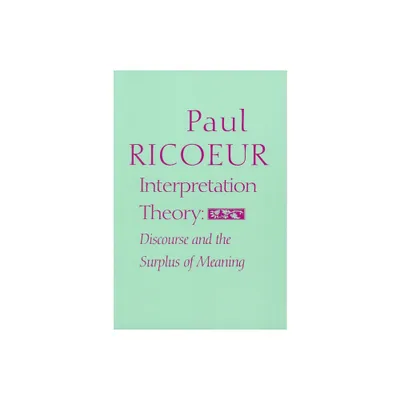Home
Paul Ricoeur's Hermeneutics and the Discourse of Mark 13: Appropriating Apocalyptic
Loading Inventory...
Barnes and Noble
Paul Ricoeur's Hermeneutics and the Discourse of Mark 13: Appropriating Apocalyptic
Current price: $103.00


Barnes and Noble
Paul Ricoeur's Hermeneutics and the Discourse of Mark 13: Appropriating Apocalyptic
Current price: $103.00
Loading Inventory...
Size: Hardcover
*Product Information may vary - to confirm product availability, pricing, and additional information please contact Barnes and Noble
The apocalyptic discourse of Mark 13 predicts that cataclysmic events will occur within the generation of Jesus’ contemporaries, but readers today know these events have not taken place. Paul Ricoeur’s hermeneutics enables a reader to understand this text as a presentation of truth rather than as a failed prediction. Ricoeur argues that the meaning of a text is not defined by the author’s intention nor by the reader’s reception, but by the text itself. Therefore, although Mark 13 was originally understood literally, today’s reader is able to read it as metaphor, and to discern latent meaning that is present in the text. As Ricoeur explains, metaphor associates previously unrelated concepts and creates new, multiple meanings. In doing, metaphor is able to present truth, not as a verifiable presentation of the world, but as a novel manifestation of the world. Mark 13 functions as metaphor because of a double dissonance: first between the configured world of the text and the lived world of the reader, and second between claim that Jesus is able to predict when the events will take place (v. 30) and the assertion that he is not able to do so (v. 32). One option for the metaphorical meaning that Mark 13 offers for today’s reader is the perception of the presence of forces that challenge and subvert powers which appear to be dominant, and which deceive, destroy, and persecute.This book will appeal to two sets of readers. First, scholars who study New Testament apocalyptic texts and the eschatological expectations of the early church will appreciate a new approach to a challenging subject matter. Second, Ricoeur scholars who focus upon the religious aspects of his work will enjoy the employment of his interpretive approach on a Biblical genre that has heretofore receive only cursory attention.


















